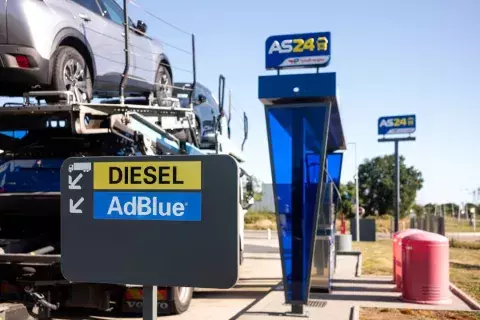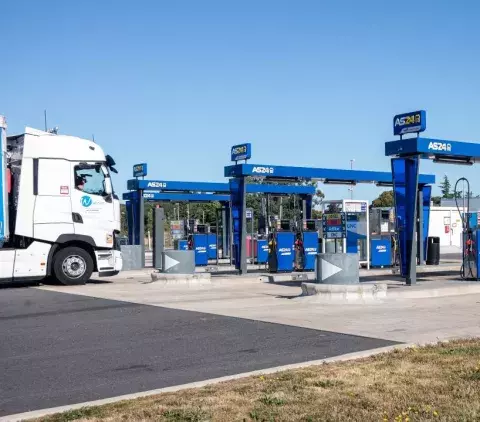
AS 24: A WIDE ADBLUE® DISTRIBUTION NETWORK IN EUROPE
The distribution of AdBlue® is essential for the operation of the new generations of HGVs. AS 24 is expanding its network and supporting transport professionals.

AS 24 makes it easier to fill up with AdBlue®. In the AS 24 network, our customers have access to:

Image
AdBlue® is an aqueous solution of 32.5% high-purity urea and 67.5% demineralised water complying with ISO 22241. The urea used in AdBlue® is a high-purity synthetic product, generally made from natural gas, and used in chemical fertilisers and plastics. |
Image
Biodegradable, water-soluble and colourless, AdBlue® crystallises at -11°C and breaks down to form ammonia at 80°C. |
Image
AdBlue® is classified as a non-hazardous product. |
Image
AdBlue® is used in diesel vehicles equipped with Selective Catalytic Reduction (SCR) technology. SCR is the exhaust gas treatment technology that converts nitrogen oxides (NOx) into water vapour and nitrogen in a catalytic converter using AdBlue®. |
Image
AdBlue® is kept in its own tank, separate from the diesel fuel. |
| AdBlue® is a registered trademark of the German Association of the Automotive Industry (VDA), which ensures that product quality standards are maintained. |
ADBLUE® CONSUMPTION
AdBlue® consumption is roughly proportional to mileage. Other factors, such as the type of driving, the ambient temperature or the type of route, also affect its consumption.
The average use of AdBlue® for HGVs is 4 to 5% of diesel consumption.
WHAT ARE THE ADVANTAGES OF AdBlue®?
Image
Reduction in NOx emissions: | Image
Ease of use: |
Image
Compliance with environmental standards: | Image
Extended engine life: |
Image
Access to low emission zones: |
ADBLUE® IN PRACTICE:
| At AS 24 fuel stations, it is not normally possible to put AdBlue® in the diesel tank by mistake. The nozzle is fitted with a foolproof device to prevent it from operating unless the nozzle is in the AdBlue® tank. Similarly, it is not possible to fill the AdBlue® tank with diesel, as the inlet of the AdBlue® tank is smaller than the diameter of the diesel nozzle. AdBlue® must never be mixed with water or other substances, especially diesel. This mixture is very risky because it can seriously damage the SCR system and result in costly repairs. |
HOW ADBLUE® AND SCR TECHNOLOGY WORK IN PRACTICE:
AdBlue® meets the new standards set by manufacturers who have upgraded their exhaust systems to comply with European anti-pollution standards (Euro IV onwards).
Combustion of the fuel produces NOx (nitrogen oxide), which results from the combination of nitrogen and oxygen in high-temperature air.
AdBlue® is injected into the exhaust pipe, located before the SCR catalytic converter and after the engine. When heated in the exhaust, AdBlue® breaks down into ammonia (NH3) and carbon dioxide (CO2).
When NOx reacts with ammonia inside the catalyst, the harmful NOx compounds are transformed into harmless nitrogen (N2) and water (H2O). The chemical reaction must follow this sequence. AdBlue® and diesel must never be mixed beforehand!